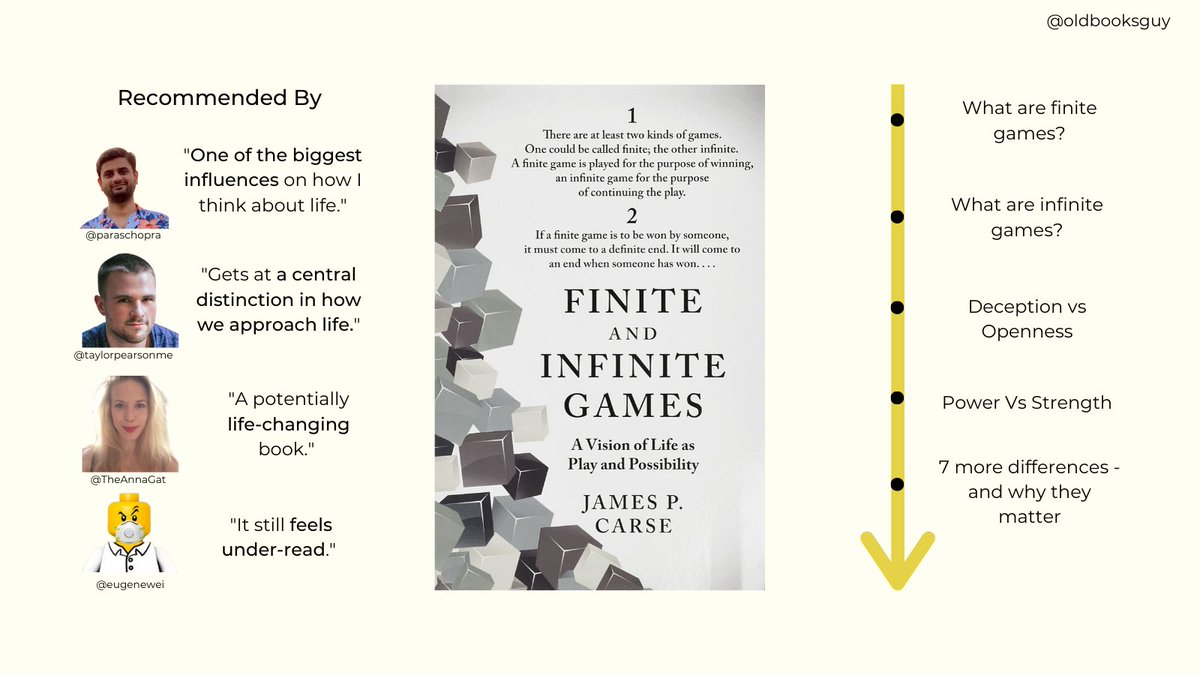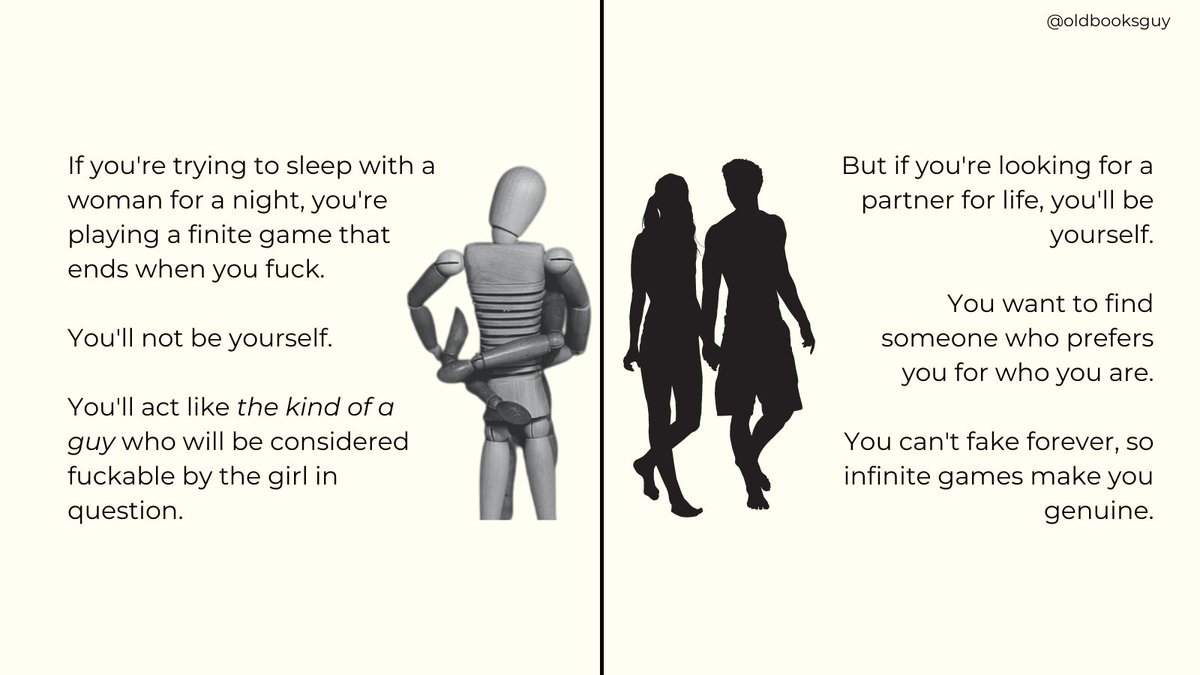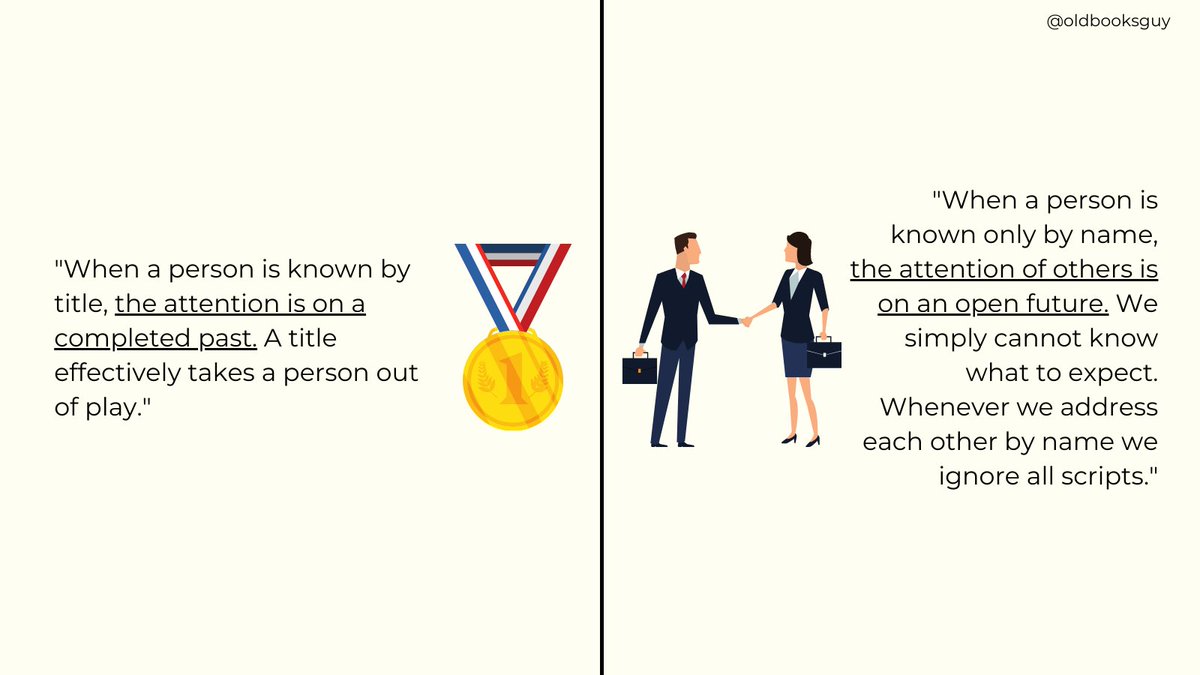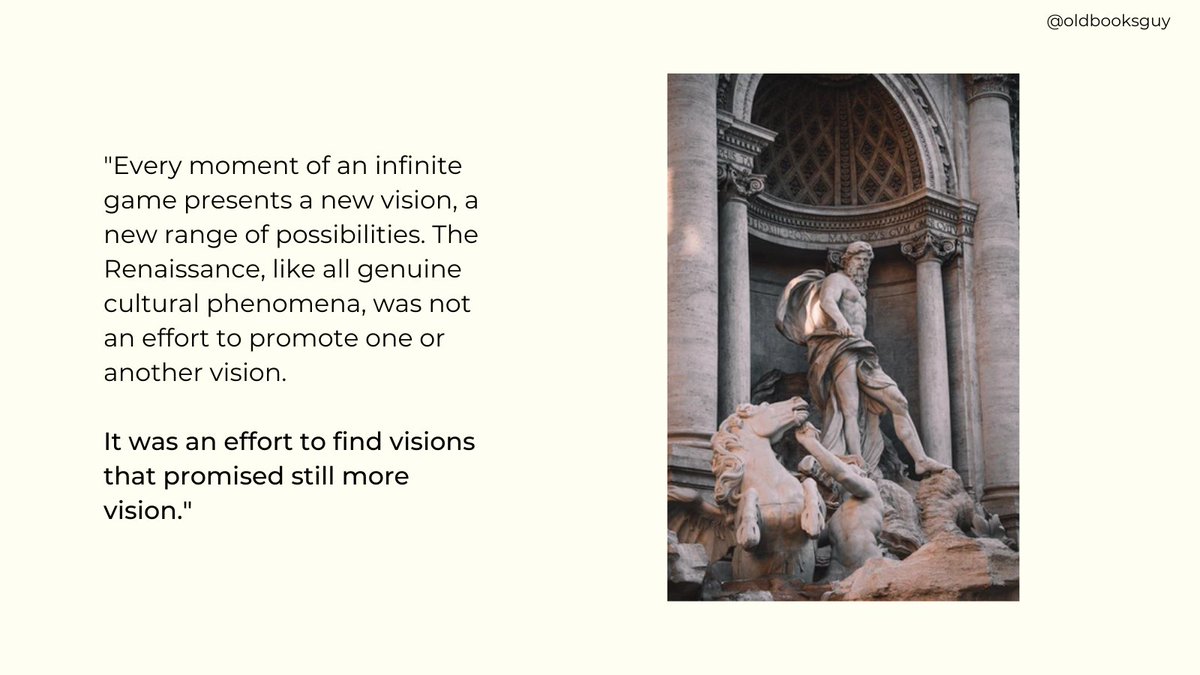Discover an old but brilliant book today: Finite And Infinite Games (1986)
This book comes with high praise from some of my favorite accounts
In this thread, I explore:
- The meaning of finite & infinite games
- Their 9 main differences
- Why this framework is useful
 https://abs.twimg.com/emoji/v2/... draggable="false" alt="👇" title="Rückhand Zeigefinger nach unten" aria-label="Emoji: Rückhand Zeigefinger nach unten">
https://abs.twimg.com/emoji/v2/... draggable="false" alt="👇" title="Rückhand Zeigefinger nach unten" aria-label="Emoji: Rückhand Zeigefinger nach unten"> https://abs.twimg.com/emoji/v2/... draggable="false" alt="👇" title="Rückhand Zeigefinger nach unten" aria-label="Emoji: Rückhand Zeigefinger nach unten">
https://abs.twimg.com/emoji/v2/... draggable="false" alt="👇" title="Rückhand Zeigefinger nach unten" aria-label="Emoji: Rückhand Zeigefinger nach unten"> https://abs.twimg.com/emoji/v2/... draggable="false" alt="👇" title="Rückhand Zeigefinger nach unten" aria-label="Emoji: Rückhand Zeigefinger nach unten">
https://abs.twimg.com/emoji/v2/... draggable="false" alt="👇" title="Rückhand Zeigefinger nach unten" aria-label="Emoji: Rückhand Zeigefinger nach unten">
This book comes with high praise from some of my favorite accounts
In this thread, I explore:
- The meaning of finite & infinite games
- Their 9 main differences
- Why this framework is useful
1/ What are finite games?
Finite games are played with the intention to win.
All finite games strive towards a conclusion.
You can win a finite game, or lose it.
Example: Sports.
Finite games are played with the intention to win.
All finite games strive towards a conclusion.
You can win a finite game, or lose it.
Example: Sports.
2/ What are infinite games?
Infinite games are played with the sole intention to *keep playing*
Example: Relationships
Infinite players sidestep endings.
If the current trajectory points at an end, they change the trajectory.
Infinite games are played with the sole intention to *keep playing*
Example: Relationships
Infinite players sidestep endings.
If the current trajectory points at an end, they change the trajectory.
3/ Finite games have constant rules. Infinite games have variable rules.
A football match can only start, and end, if both sides agree to the rules
But if an infinite game is in danger of ending, the rules are changed
Rules serve to continue the infinite game, not conclude it.
A football match can only start, and end, if both sides agree to the rules
But if an infinite game is in danger of ending, the rules are changed
Rules serve to continue the infinite game, not conclude it.
4/ Finite players eliminate possibility. Infinite players *create* possibility.
In a finite game, you try to eliminate all possibilities except the 1 where you win.
But infinite games are most alive when new possibilities emerge ("He still surprises me - I love that about him")
In a finite game, you try to eliminate all possibilities except the 1 where you win.
But infinite games are most alive when new possibilities emerge ("He still surprises me - I love that about him")
5/ Finite games make you inauthentic. Infinite games make you authentic.
In a finite game, you act out "the abstract requirements of a role."
In an infinite game, you& #39;re a concrete person being yourself *without* driving at a certain conclusion.
In a finite game, you act out "the abstract requirements of a role."
In an infinite game, you& #39;re a concrete person being yourself *without* driving at a certain conclusion.
7/ Finite games end with titles: Gold Medalist, World Heavyweight Champ, and so on.
Infinite games - like life itself - *begin* with names.
Infinite games - like life itself - *begin* with names.
8/ Don& #39;t aim for power, aim for strength.
Wait, aren& #39;t they the same?
No.
Power is the ability to bring about the outcomes you want, strength is the ability to face unpredictable outcomes.
You win finite games with power.
You keep infinite games going with strength.
Wait, aren& #39;t they the same?
No.
Power is the ability to bring about the outcomes you want, strength is the ability to face unpredictable outcomes.
You win finite games with power.
You keep infinite games going with strength.
9/ In a finite game you protect boundaries.
Examples: In cricket you protect the boundary ropes, in football the goal post.
In an infinite game you seek new horizons.
A horizon is "simply the point beyond which we cannot see."
You never reach horizons, only find new ones.
Examples: In cricket you protect the boundary ropes, in football the goal post.
In an infinite game you seek new horizons.
A horizon is "simply the point beyond which we cannot see."
You never reach horizons, only find new ones.
10/ Finite games end in explanations, infinite games continue with narratives.
"Explanations settle issues. Narratives raise issues. Explanation sets the need for further inquiry aside; narrative invites us to rethink what we thought we knew."
"Explanations settle issues. Narratives raise issues. Explanation sets the need for further inquiry aside; narrative invites us to rethink what we thought we knew."
~fin~
Enjoyed this thread? Support my work by buying me coffee:
Enjoyed this thread? Support my work by buying me coffee:
Thanks for reading.
Follow @oldbooksguy for more threads on old books!
Click here if you want to be notified on Whatsapp when I publish my next thread: https://wa.me/message/P4QLGGS3AP5FC1">https://wa.me/message/P...
Follow @oldbooksguy for more threads on old books!
Click here if you want to be notified on Whatsapp when I publish my next thread: https://wa.me/message/P4QLGGS3AP5FC1">https://wa.me/message/P...
Share this so more people play infinite games, more often. :) https://twitter.com/oldbooksguy/status/1377116420513746944?s=20">https://twitter.com/oldbooksg...

 Read on Twitter
Read on Twitter https://abs.twimg.com/emoji/v2/... draggable="false" alt="👇" title="Rückhand Zeigefinger nach unten" aria-label="Emoji: Rückhand Zeigefinger nach unten">https://abs.twimg.com/emoji/v2/... draggable="false" alt="👇" title="Rückhand Zeigefinger nach unten" aria-label="Emoji: Rückhand Zeigefinger nach unten">" title="Discover an old but brilliant book today: Finite And Infinite Games (1986)This book comes with high praise from some of my favorite accountsIn this thread, I explore: - The meaning of finite & infinite games- Their 9 main differences- Why this framework is usefulhttps://abs.twimg.com/emoji/v2/... draggable="false" alt="👇" title="Rückhand Zeigefinger nach unten" aria-label="Emoji: Rückhand Zeigefinger nach unten">https://abs.twimg.com/emoji/v2/... draggable="false" alt="👇" title="Rückhand Zeigefinger nach unten" aria-label="Emoji: Rückhand Zeigefinger nach unten">https://abs.twimg.com/emoji/v2/... draggable="false" alt="👇" title="Rückhand Zeigefinger nach unten" aria-label="Emoji: Rückhand Zeigefinger nach unten">" class="img-responsive" style="max-width:100%;"/>
https://abs.twimg.com/emoji/v2/... draggable="false" alt="👇" title="Rückhand Zeigefinger nach unten" aria-label="Emoji: Rückhand Zeigefinger nach unten">https://abs.twimg.com/emoji/v2/... draggable="false" alt="👇" title="Rückhand Zeigefinger nach unten" aria-label="Emoji: Rückhand Zeigefinger nach unten">" title="Discover an old but brilliant book today: Finite And Infinite Games (1986)This book comes with high praise from some of my favorite accountsIn this thread, I explore: - The meaning of finite & infinite games- Their 9 main differences- Why this framework is usefulhttps://abs.twimg.com/emoji/v2/... draggable="false" alt="👇" title="Rückhand Zeigefinger nach unten" aria-label="Emoji: Rückhand Zeigefinger nach unten">https://abs.twimg.com/emoji/v2/... draggable="false" alt="👇" title="Rückhand Zeigefinger nach unten" aria-label="Emoji: Rückhand Zeigefinger nach unten">https://abs.twimg.com/emoji/v2/... draggable="false" alt="👇" title="Rückhand Zeigefinger nach unten" aria-label="Emoji: Rückhand Zeigefinger nach unten">" class="img-responsive" style="max-width:100%;"/>










